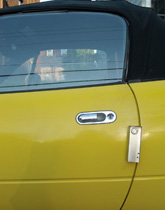
Your neighbor's car is waiting for you
At a pace of about eight minutes a mile, Craig Gaites runs alongside Jay Sizemore and other classmates. They are all part of the Tepper Endurance Club, a group of business students who get together regularly to work out. It's the middle of winter in Pittsburgh, so ice patches and mounds of packed powder riddle the sidewalks. As Gaites weaves along, he updates Sizemore—like he often does on these jogs—on his burgeoning business venture.
TransportCHAIN would be the first person-to-person car-sharing service around. The idea is profoundly simple: Car owners would earn money on their vehicles whenever they aren't driving them. Using a tracking device, TransportCHAIN's Web site would match car owners with on-the-spot renters. With approximately 237 million private vehicles owned and operated in the United States alone, there is a massive target market. Gaites (TPR'10, HNZ'10) is intrigued with how the need for fewer cars would also have a positive effect on the environment.
But how, he asks Sizemore between breaths, can car owners easily and safely get the keys to people who have rented their cars? Gaites and his academic advisor and TransportCHAIN cofounder, Robert Hampshire, a Heinz College assistant professor of operations research and public policy, have been grappling with this dilemma for weeks and are considering key lockboxes, similar to those used by realtors to access homes.

Sizemore (TPR'10) thinks it's a good idea, but he also plays devil's advocate. "You want to mount it to a car? That's a big deal," he says. He raises concerns about damaging the car's exterior and making it more susceptible to theft. "It's critical that you get this right."
Gaites agrees, and the two split from the other joggers. At Gaites' apartment, they hurriedly sketch lock box models in a notebook and, sensing a breakthrough, step outside to Gaites' Mazda Miata. They shove snow into the driver's side doorjamb, where they speculate a box could be mounted. Gaites slams the door, opens it, and extracts the remaining snow mold. Cutting this mold into cross sections, they record measurements that eventually become part of a patent application and TransportCHAIN's business plan.
Gaites has not only solved his dilemma, he's found another business partner, who becomes TransportCHAIN's vice president of product development. Turns out that Sizemore, before enrolling at Carnegie Mellon, worked for Honda and Acura. He was responsible for anti-theft designs. "There are [cars] running around in the market right now that are theft-proof, kind of because of me."
Several weeks after that wintry jog, Gaites pitches TransportCHAIN to a panel of renowned business leaders and venture capitalists at Tepper's McGinnis Venture Competition, where graduate students from around the world compete for start-up capital and consulting services. TransportCHAIN takes the grand prize in the CleanTech track and is awarded $40,000 in start-up capital and services. With the help of that funding, the partners formed Go-Op to take TransportCHAIN live this summer in Pittsburgh with other cities to follow.
—Mark Kramer



